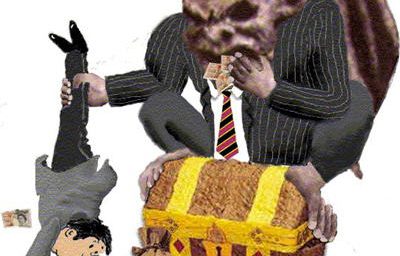Tax Cuts & Revenues
Brendan Nyhan notes that John Kerry was rather prescient in that it wouldn’t take long before the Republicans would issue a call to lower taxes to counter the deliterious effects of Katrina.
Last Wednesday, I flagged this passage from a John Kerry email to supporters:
How long will it be before [Republicans] start telling us that tax cuts for the wealthy can provide just the stimulus we need to get the Gulf Coast economy moving again?
My response: “I’d say a week, maybe less.”
The problem is that from this pretty good start Nyhan slides right into misrepresentation when he writes the following,
Norquist is implying that tax cuts generate revenue rather than reducing it — a discredited bit of supply-side cant that even Bush administration economist Greg Mankiw has disavowed.
First off, the idea that cutting taxes can actually raise revenues is not something that is unique to supply-side economics. The idea is that tax revenues are a function of tax rates, and that starting at zero tax revenues are also zerot. At the other extreme (income) tax rates of 100% would also yeild zero tax revenue (the idea here being why work [at a paying job] when everything you earn goes to pay your taxes). So we know that at both end points revenues are zero. Thus, it isn’t too much of a stretch to conclude that initially tax revenues rise, then decline. Hence there are at least two tax rates that will generate the same amount of tax revenue, one tax rate being high and the other being low.1 This theorestical model is pretty basic and not too many would dispute it. Where the argument comes in is exactly where on the tax revenue “curve” we are currently at. If we are on the portion where tax revenues increase when tax rates increase then decreasing tax rates will decrease revenues.
By implying that cutting taxes in general is a discredited notion Nyhan is misleading his readers. Further, indicating that Mankiw also supports this view is misleading in that reading Mankiw’s comments it seems more accurate to say that he thinks the Bush tax cuts in specific were unlikely to raise tax revenues. Making such a statement about a specific tax cut cannot be generalized to any and all tax cuts.2 It is quite likely that we are currently at a point on the tax revenue curve where tax cuts simply cannot result in tax revenue increases.
In short, the concept is completely legitimate and actually predates the notion of supply-side economics and the Reagan administration. Arguing that we are at a point where tax cuts cannot raise tax revenues is legitimate. Arguing that this whole concept, commonly known as the Laffer curve, is problematic for setting tax policy, is also legitimate, in my opinion. Saying (or even implying) it is entirely discreditted is misleading.
_____
1It is also possible that there is more than two tax rates that result in the same amount of tax revenue, and in one case there is one tax rate that yields the maximum tax revenue.
2Mankiw’s actual statement was,
Mankiw said Moore was criticizing “a passage where I had raised skepticism about claims that tax cuts would generate so much employment growth as to be completely self-financing. And I remain skeptical of those claims.” Mankiw added that “the most extreme advocates of tax cuts, I think, sometimes paint an excessively rosy picture out of what they can get out of them. I don’t think this administration has done that.”





There is no emperical evidence that cutting taxes raises revenue. There is plenty of evidence that deficit spending raises tax revenue but none that a tax cut along with a spending cut has ever increased tax revenue.
It is interesting to note that this is the first ruling class in American history, or in world history for that matter, that holds that the way for the government to raise revenue is to take a tax cut for themselves.
Increased tax rates have always led to increased revenue. We have never had a tax increase that led to lower revenue. Reagan raised taxes by the largest amount ever. Guess what happened? Revenues went up. Clinton raises taxes just a little bit. And again revenues went up.
This is not rocket science, it is common sense.
Where are you getting your info? The WSJ today has a front page story on how republicans are halting bills in congress to lower taxes (or extend the Bush tax cuts) and that further tax cuts are “off the table”.
While we can debate whether that tax cuts are right or not, the issue is that no one is advocating lowering them right now.
Ken, don’t be an idiot. Of course, at the current tax rates, the idea of an aggregate reduction in taxes leading to more revenue is dubious at best. That doesn’t mean that any and all tax increases will always yield increased tax revenues.
Further, in looking at people in different income levels might still show some responsivness to tax changes.
The real issue is that for a quarter of a century the supply side advocates claimed that cutting taxes would lead to higher savings, greater investments, stronger growth and smaller deficits.
Essentially every one of these claims have been disproved by events.
The savings rate has fallen from 13% to zero.
Investments has fallen from 14% OF GDP under carter to 10% of GDP under Reagan, back to 13% of GDP under Clinton and 10% of GDP under Bush..
Real GDP and per capita real income, and almost every measure of economic wellbeing has experienced slower growth since 1980 then they did from 1960 to 1980 under Keynesian economic policies.
Federal revenues are now the smallest share of GDP since Ike.
Essentially all the supply-side economic policies we have followed for a quarter of a century have accomplished is to turn US the worlds largest creditor to the worlds largest debtor.
Supply side economics is based on a false premise that cutting individual tax will lead to greater investments. But in the US economy personal savings has essentially nothing to do with investments. Essentially all of investments are financed by business profits, so cutting personal taxes has no impact on investments.
Spencer,
You know better, so why post that? You know that investment is not determined by tax rates alone. Samething with savings.
I will grant you that the predicitons/promises of the supply-siders have all turned out false, and that using the Laffer curve for policy making is quite problematic, but at the same time the notion behind it is valid. It is most likely the case that the U.S. is currently operating in the range where raising taxes rates raises tax revenues. Hence your claim of a false premise is not accurate as a general claim, but only locally for current tax rates.
Thanks. You’ve hit an important nail on the head and I hope you keep hitting it. We are looking for the ideal points were tax rates do not significantly impact economic growth. Beyond that we are looking for types of tax cuts applied to which sectors effect various problems.
As an investor I am concerned that cutting tax rates among the wealthy and rewarding dividends and capital gains fails to spur actual new investment which is a function of venture capital and lending; but does prive various equities very high subjecting them to unhealthy falls. Stocks remain valued at 1929 levels, the equivalent of p/e in real estate price/rent is at historical highs. Short and medium terms gains can result in collapse if one assumes that these things have some sort of historical value which may shift but not by the percentages that “this time is different” advocates offer.
I wish our politicians could start talking in moderate level of complexity about these things and that it was undrstood that various concepts need not be attached to each other. A simplified income tax need not be a flat tax. And social security investment in stocks which may be a good idea for long term time frames does not require private accounts.
Similarly a cut in rates to increase investment among the middle class can be done at moderate levels, we need not protect billionaiares. Perhaps a million dollar lifetime capital gains tax which includes benefits now applied to homes since in a rational world people shuld know there can be superior return by renting and using the savings for stocks. Lower rates can also be applied to the first amount generated by a business.
You know people can remember a starlets every romance, her faviorite vegetarian dish, the complexities of her relatiionship with her mom, but they glaze up when relatively simple financial concepets are expressed. It hurts them in their personal life where they invest like idiots or often pay 1 1/2% on capital for professionals who average less than indexed returns. It hurts us politically because they have no grasp of the complexities of various policies or even how much is devoted to what expence. then they will announce if x is cut we can have y not knowing if the numbbers are similar just that they’re “big.” The rsult is widely held beliefs in various possibilities up and down the spectrum, except the numbers don’t add up.
And while Republicans use general concepts imprecisely without detail, Democrats are so adverse that they can’t even quote Friedman and say tax cuts that are not payed for with spending cuts are future tax increases. I might add with interest of various types including the probability that when the dollar falls it will thump harder than otherwise and that we have handed over the power to wreak havoc on our economy to China.
A recent market watch article indicates the tax cuts are still on. Delay wants them. There are indications of a split in the party.
I expect the huge size of the bailout and the fact that thee seems to be no analysis in it will further conflicts. Essentially the “Republican Guard” is now arguing that failure to deploy existing resources was fine, because red tape is good in the face of disaster if it limits federal government, but limited government has no role if it cuts back pork and buying votes.
The presidents acceptance of responsibility while a bit vague also undercuts a major rightwing talking point.
I am hopeful that we will see some reformation and that like other historical figures Bush will rise to potential, but I also fear that the shattering of the faith based reality machine could result in something akin to madness.
I despite Democrats who look foreward to the latter.
I was (and am) an early supply sider but am greatly bothered by the current crop.
The current supply-siders tend to take an incredibly simplisitic view of the world, thus coming up with tax cuts as the cure for everything.
Having been around a few years (and having been a tax professor for 15 or so years) I know there is a point as which higher incremental rates skew investment decisions and encourage wasteful sheltering activities. Accordingly there are implications for economic growth, and then, tax revenues.
I also think there is a point at which higher rates tend to protect established corporations at the expense of entrepreneurs.
The real questions for federal government policy are this:
1. How much of the GDP should flow through Washington?
2. How should that amount be collected?
The first argument should be about #1. Then #2.
Ken,
That is not entirely true. As tax rates change so can behaviors. One example is cigarette taxes in New York. As NY City increased taxes (rightly or wrongly) on cigarette, an increase in people avoiding taxes appeared and the increase actually made New York lose money: (see below)
$200M lost to smokes smugglers
Yearly city, state tax shortfall from gang & Internet sales
NY Daily News
September 23, 2002
Freelance smugglers, organized crime and Internet sources are flooding New York’s neighborhoods with cheap cigarettes that would bring the city and state upward of $200 million a year in taxes on the legitimate market.
With premium brands such as Marlboro going for $7.75 a pack in many stores throughout the five boroughs and cartons going for $70 and more, thousands of smokers have chosen to buy either smuggled smokes – or untaxed cigarettes from more than 144 Internet sites, which are legal but unregulated.
The boom in underground cigarettes was touched off by the July 2 increase in city taxes to $1.50 per pack from 8 cents apack and a bump in
state taxes to the same $1.50 per pack from $1.11, according to government officials and tobacco wholesalers.
In July and August, 24.5 million fewer packs of legitimate cigarettes were sold in retail outlets throughout the city than in July and August last year, according to the city Finance Department. That’s a drop of 41%.
Smuggling to the city from lower-tax states such as Virginia (2.5 cents a pack total) generates tremendous profits for ringleaders – up to $25,000 for a day’s work involving a van loaded with 2,500 cartons, said Edgar Domenech, special agent in charge for the federal Bureau of Alcohol, Tobacco and Firearms’ regional field division.
Additionally, tax rates (amoung other issues) can determine how attractive a city or state is to investors: look at Boeing and Seattle for an example.
Jim, I see your point. But I was referring to the federal income tax situation where tax increases, in fact, have lead to revenue increases. I guess I could have made that clearer.
No it doesn’t. I suppose someone could propose a federal tax increase that is actually designed to yield less revenue, but I doubt it would ever get passed. For all practical purposes the best way to increase federal revenue is through a tax increase. The next best way, deficit spending, has become overused and has weakened our balance sheet too much. Cutting taxes to raise revenue is just plain stupid.
Steve, my meaning above is not very clear. I meant: No, your right, it doesn’t.
The best way to increase revenue and cut taxes is to put a fiscal lid on those who are in charge of spending. Thats right. those tax and spend politicians.
Regan had it right when he wanted the Line Item Veto.
The problem is, the people themselves that insist their “Representative” bring home as much Pork as possible and keep voting the spenders back into office.
Bottom line is Bush never met a spending measure he did not love… a true rich kid who never had to earn a living.
Sadly, all too true.